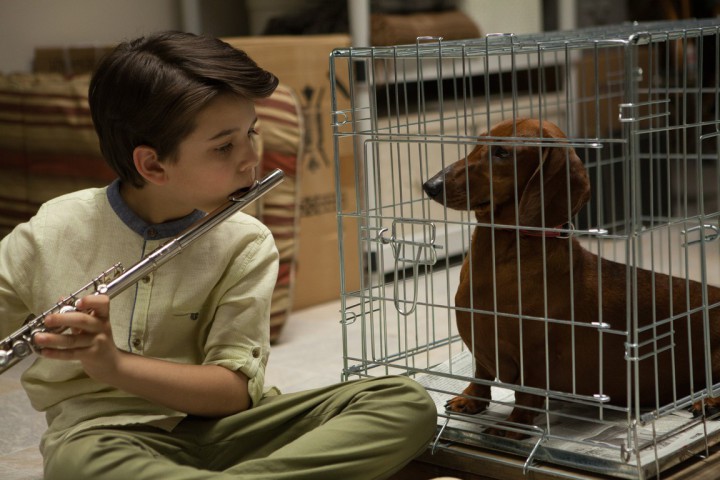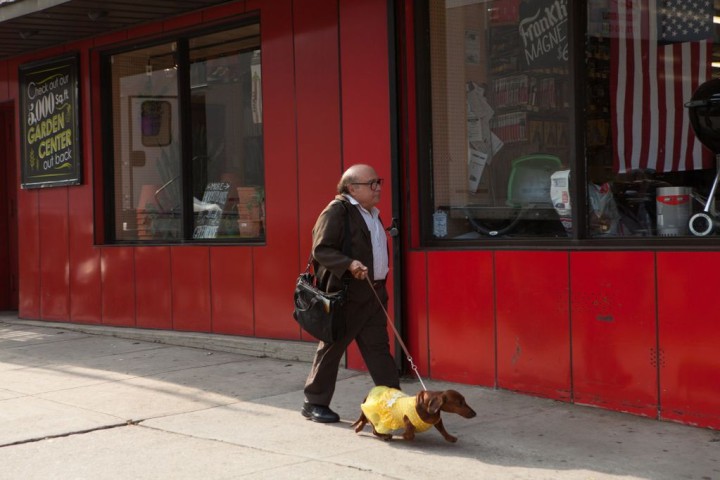Todd Solondz is most certainly an acquired taste, but those who appreciate this distinctive auteur’s morbid and often depressing aesthetic will find Wiener Dog a tour de force. For those of the appropriate bent, this film is required viewing.

As a longtime fan of Solondz’s oeuvre, the prospect of revisiting the characters from Welcome to the Dollhouse gave me pause because I have always felt that film to be complete in and of itself. Add to that initial trepidation this nominal sequel’s narrative and structural debt to Robert Bresson’s Au Hasard Balthazar — a film to which very few compare favorably — and you can understand why my optimism was tempered. I am happy to say that my concerns were unfounded, as Wiener Dog currently sits near the top of the pile in my assessment of Solondz’s catalog.

One of the most impressive and surprising facts evident in Wiener Dog is that this is clearly the work of a filmmaker whose output has reached its maturity, even if that work has always been characterized by an innate sense of immaturity. Solondz may not have softened with age, but he has certainly learned to temper his anarchistic sadism with a pathos more sincere than the cringe-inducement he has traditionally favored.
This is certainly not to say that Solondz’s pitch-black humor and bleak worldview have taken a back seat — they are just as biting as ever. The dog in question is alternately named “Doodie” by Greta Gerwig’s Dawn Wiener (“Like s—?” asks Kieran Culkin) and “Cancer” by a grizzled grandma (Ellen Burstyn). But there’s something deeper going on in Wiener Dog, the exploration of a broadened emotional palette for Solondz. Sure, the climax of the first vignette is punctuated by a lengthy tracking shot of the titular Dachshund’s diarrhea, but that shot is beautifully executed by cinematographer Edward Lachman (Carol), and scored with Claude Debussy’s “Clair de Lune,” in a tragic sequence that inexplicably manages to transcend the obvious irony and scatological humor. A remarkable camera setup placing Gerwig and Culkin in the same frame through a masterful use of motel room mirrors (as the former listens to a hitchhiking mariachi band and the latter shoots up) evokes a sense of isolation that would not be out of place in a Ingmar Bergman film. Solondz has been criticized in the past as having a mastery of only soul-crushing ennui and despair as emotional notes. With Wiener Dog, however, the director seems to have developed a genuine affection for his characters — the dog included — even as he puts them through hell. And he expresses all of this through purely filmic means.
While Solondz’s cinematic and narrative accomplishments are indeed laudable, they are in danger of being overshadowed by the exemplary performances he coaxes out of his cast. While I was initially skeptical of Gerwig’s casting as Dawn (Heather Matarazzo was approached, but declined to reprise the role), she absolutely nails the character’s quintessentially awkward screen presence. Julie Delpy is a standout, showcasing superb comedic timing as a French ex-pat who’s now a suburban soccer mom. Ellen Burstyn revels in her role as a crotchety, Kaopectate-chugging grandmother confronting her mortality. But, for my money, Danny DeVito steals the show as an over-the-hill screenwriter and increasingly obsolete New York University film professor pushed to his breaking point by an aggressively progressive administration and a dilettantish student body more worried about making films that transgress normative gender identities than they are about learning to tell stories. (It’s obviously difficult not to draw assumptive parallels with Solondz’s own position as an NYU professor here.) I can honestly say that Wiener Dog marks the first time I’ve ever teared up watching Danny DeVito, so that should give you some sense of what he pulls off with this performance.
Wiener Dog manages to hit all the appropriate Solondz notes, from in-crowd film references to meditations on the masochistic mundanity of modern life, and yet adds a fascinating new level of complexity to the proceedings. After all, I doubt anyone could’ve predicted that he might deliver a happy ending for Dawn. (The closest thing to a happy ending — euphemisms aside — that any character gets in a Solondz film, of course.) The director has famously been quoted as saying, “My movies aren’t for everyone, especially people who like them.” Wiener Dog might just make him eat those words. Rated R for language and some disturbing content.
Now playing at Grail Moviehouse







Seriously why would any respectable theatre run this film which includes Muslim bashing which is just what our society does not need and is totally not funny. I am a film officionado, film critic and teacher of film who was attracted to the cast. Not only does the plot not hold together but what animal rights group would not be angered by the ending where Weiner dog is run over multiple times into a mess of blood and guts. If this is what film audiences are into them we are in serious trouble.
Your observations explain why this ran at the freshman enterprise of the Grail and not the more established Fine Arts Theater. Very experimental. I do think you doth protest too much about Islamophobia and CGI-crushed dogs. This is small change when compared to the boundaries that indie films are constantly pushing.
Thanks! I think the Director weighed in when he said something to the effect that if you liked this film there is something wrong with you . In today’s climate calling Mohammed a rapist to strike and strike again is not funny but is tasteless. Thanks for pointing out that the public can expect films like this from The Grail but never Fine Arts. You’ve just help me renew my loyalty to a great movie house- Fine Arts. No more Grail.
First of all, I find this Grail bashing to be distinctly misguided. If you didn’t go to movie theaters that scheduled movies you don’t like, or films that might offend your sensibilities, you wouldn’t have any theaters left to patronize. Asheville is very fortunate to have two locally-owned theaters screening independent and art house films with essentially no overlap, especially considering the fact that many cities larger than ours don’t have a single one. If you forgo the Grail because of movies like Wiener Dog, you’ll also miss your opportunity to see things like Life, Animated.
Secondly, I should point out that the example of “muslim bashing” to which you refer is a throw-away line issued by possibly the closest thing that this film has to an antagonist, and she also makes a similar comment about the Holocaust. If a film features Nazi villains, is that film therefore antisemitic?
Finally, I’d like to say that I’m sorry you didn’t enjoy the Wiener Dog. I have to ask, how familiar are you with Solondz’s previous films? I tried to make it clear in my review that this movie would probably only appeal to fans of the director’s work, and I can’t imagine anyone who’s seen Happiness or Storytelling or even Welcome to the Dollhouse being shocked by what’s on display in Wiener Dog, unless they were shocked by the fact that it’s not quite as oppressively hopeless as any of those films.
I hope you were not lumping MY comment in with Ms. Larson’s as it was NOT meant as a criticism of the Grail. I merely presumed that a relatively experimental film like this one would be distributed at a lower price than the FAT’s usual fare and thus more affordable for a start-up theater like the Grail. More of a comment on price point than on value of content, although the two are somewhat connected. While “Weiner Dog” did not rock my world, I found it interesting enough not to leave feeling that I had thrown my money away. To be honest, I would probably pay to watch Greta Gerwig read from a phone book.
Summer 2018: Greta Gerwig in Yellow Pages
I interpreted your comment largely as intended, although I’m reasonably sure that the Fine Arts has screened Solondz in the past, so I don’t think they’re fundamentally opposed to booking his work.
I have to wait until 2018!?!?!?
We don’t even have a script yet!